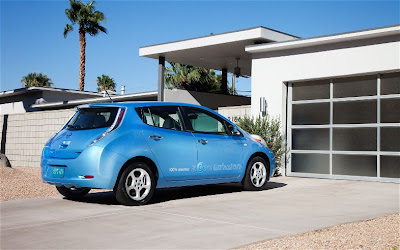Monday, March 16, 2015
2012 Nissan Leaf

Introduced just last year, the Nissan Leaf was the first full-electric vehicle to be marketed to mainstream American buyers. In many ways, it succeeds in being just as accessible as its manufacturer intends. The Leaf has a spacious cabin, with a tall, airy greenhouse that comfortably seats four full-size adults and provides excellent visibility. On the road, the car boasts peppy acceleration and, were it not for the lack of engine noise, youd probably be convinced youre driving one of any number of gas-powered models. And though the Leafs cargo capacity is on the small side, this Nissan has hatchback utility in its favor.
Once you factor in the $7,500 federal tax credit (residents of certain states are eligible for additional credits as well), the 2012 Nissan Leafs pricing is quite affordable. A 220-volt home-charging station that costs $2,200 is a must-have, but the financial blow is softened by a tax rebate as well. Charging the Leaf costs less than paying for gas, though the picture may be less favorable in states with tiered electricity rates, depending on your usage.
At the end of the day, however, electric cars come with certain compromises. The EPA rates the Leafs range at just 73 miles, a number we essentially verified during a six-month test of the Leaf. This isnt a problem on shorter commutes, but it presents challenges on lengthier trips, since the number of charging stations is currently quite limited. And charging takes quite a bit longer than the minute or two youd spend filling a gas tank; plan on this process taking about 30 minutes at a quick-charge commercial station and 4-8 hours with the home charger. Of course, those are both rare, so for the moment youre likely looking at a recharge time of twice that or more with a standard electric outlet.



Officially rated at 99 mpge (miles per gallon equivalent), the city rating is an incredible 106 mpg while the highway rating is 92. That may not sound significant, but when every mile counts, it is. Crawling along in gridlock the next day it was reassuring to see the mileage range number on the dash sit idle mile after mile. But on the highway the digits would often count down like the dying seconds on a scoreboard, a rather frightening distraction as I attempted to summon Jedi-like powers to slow the countdown to what I foresaw as my inevitable destination – stranded on the side of the road.
In fact, I became so paranoid of the quickly depleting energy supply that I switched off the climate control in order to conserve as much battery life as possible. As silly as that may sound, within the Leaf’s Carwings telematics system there’s a screen that will tell you how much range you can gain by doing just that. It’s not insignificant either, totaling three whole miles on this journey. A mild inconvenience on an ideal day, my worry of reaching home was so severe I did so even with the mercury sitting at the freezing point.
Nearing my house and off the highway the range reading ceased its recessionary stock market-like fall at 17 miles and my emotions switched from worry to a cocksure attitude as I decided to drop in to the grocery store – warming my now frozen toes in the process.


For 2012, Nissan added the optional winter package as standard equipment on all Leafs, including electric warming for the battery pack, heated front and rear seats, and even a heated steering wheel. For the higher-level SL model, it added a DC quick-charging port as standard equipment (previously optional), which allows an 80-percent battery recharge in 30 minutes at rare public DC charging stations.
Along with the upgrades came higher prices, unfortunately. The base 2012 Nissan Leaf starts at $35,200, and the Leaf SL model at $37,250. Most owners are likely to qualify for a $7,500 Federal income-tax credit for purchase of an electric car, though Nissan also offers a $349 monthly lease on the car that wraps the tax credit into the price. Additional regional and corporate incentives may be available as well.
You could view the 2012 Nissan Leaf as the first vehicle for a new century of electric cars. Its on the market now, its fully a "real car" with modern features and conveniences, and it gets high safety ratings from the usual agencies. It offers an excellent demonstration why plug-in cars have a bright future--though it will take decades for plug-in cars to become a noticeable fraction of the 1 billion vehicles on the planet, and well not likely see the "end of gasoline" in any of our lifetimes.
source:edmunds.com,thecarconnection.com,autoguide.com

Subscribe to:
Post Comments (Atom)
No comments:
Post a Comment